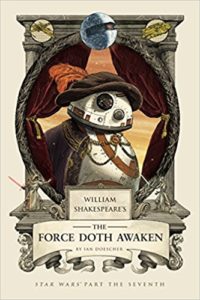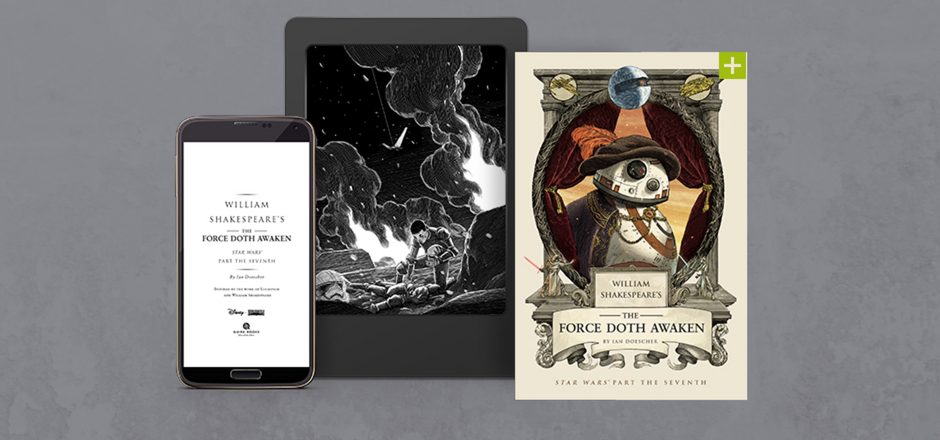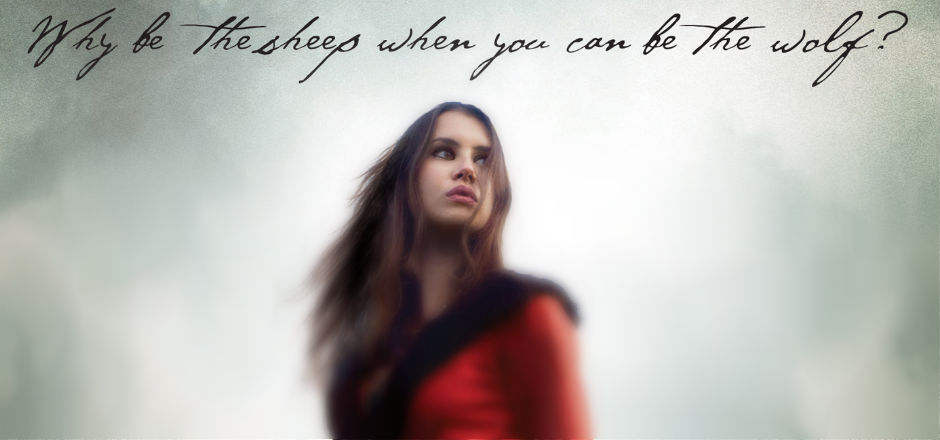Warning! This article contains spoilers for Ian Doescher’s William Shakespeare’s The Force Doth Awaken, and thereby also for the 2015 film The Force Awakens. The reviewer received a copy of The Force Doth Awaken in anticipation of this piece.
—
Have you ever wondered how a Star Wars opening scroll would read in iambic pentameter?
Yes?
No?
No, but you are now?
Then I have some good news for you: Ian Doescher’s William Shakespeare’s The Force Doth Awaken may be for you.
The Force Doth Awaken follows the plot of the film of roughly the same name, set 30 years after The Return of the Jedi. (Or, in Doescher’s saga, William Shakespeare’s The Jedi Doth Return.) It chronicles the plight of the Resistance, led by General Leia Organa, as they combat the rise of the nefarious First Order, interspersed by three intertwining narratives that follow Rey, a young scavenger of enigmatic origins; Finn, a Stor mtrooper turned deserter; and Kylo Ren, the First Order’s resident masked antagonist, yielding both the force and a temper. This is a slight deviation from the source material, in which Rey is the primary protagonist; in Doescher’s narrative, it is an even split amongst the ensemble.
mtrooper turned deserter; and Kylo Ren, the First Order’s resident masked antagonist, yielding both the force and a temper. This is a slight deviation from the source material, in which Rey is the primary protagonist; in Doescher’s narrative, it is an even split amongst the ensemble.
One of the many strengths of Star Wars, regardless of trilogy or individual film, is its menagerie of characters, and so Doescher’s choice in refocusing the narrative is one that can work: it follows the intertwining paths of a bounty of eclectic individuals and organizations, much like anything you’d find in Shakespeare’s folio. In fact, what makes The Force Doth Awaken as delightful as it is is the simple fact that Star Wars and Shakespeare share critical DNA: they focus on deep-rooted familial drama featuring the occasional act of patricide, the consequences of death – and if death even means anything, given what may or may not lie beyond – and life, deep political intrigue, and greater systems of thought and philosophy.
Star Wars is, after all, a space opera, and what is a space opera if not peak melodrama – just with laser swords? It is hard to imagine a better combination than Shakespeare and Star Wars. (Other than say, Poe and Finn, whose dynamic is elevated all the more when they speak to each other in literal poetics.)
That said, for me – and for a lot of humans before, with, and after me – one of the most compelling parts of The Force Awakens was not the political intrigue, familial fracases and dynastic decay, or even the hokey religions and ancient weapons, but its protagonist, Rey. That in Rey’s – whether figurative or literal – ancestors of Leia Organa and Padmé Amidala, there have always been incredible women to whom to look up in the Star Wars universe is unmistakable. Even in giving the esteemed Senator and General their deserved dues, also unmistakable is the feeling girls and women across our own galaxy felt when we first saw Rey take the stage as a the protagonist of a Star Wars trilogy in her own right. The moment is an indelible one.
At first, it seems it was for Doescher, too, as he opens his folio with a declaration: “To Aracelli, Addison, and Sophie, that you may grow to be as strong as Rey.”
Such a dedication suggests a valiant heroine, the likely centerpiece of her story. Coupled with the Shakesperian nature of the narrative and compounded by The Force Awakens’ subversion of the Star Wars protagonist, placing a woman at the center of its trilogy rather than a man, Doescher’s dedication also hints at the promise of soliloquies in the tradition of Hamlet or Othello, this time delivered by a woman.
Certainly, these soliloquies exist in The Force Doth Awaken… But it’s a trap.
Doescher has proven able to craft Shakespearian monologues in their truest form, aided by Star Wars’ own innately Shakespearean themes. Finn waxes poetic about life, death, and the pains of being; Kylo bemoans his own familial fatalism; Leia laments the qualification of life by one’s offspring; Poe galvanizes a fleet surging to battle; meeting an untimely end, Han evaluates life – and his own – at its summation. Even Chewbacca, whose cries are deciphered via editor’s translations in footnotes, has the play’s greatest monologue, a eulogy given after the death of his constant compatriot, Han Solo.
Rey, on the other hand, is limited to narrative soliloquies and monologues, providing backstory and action that Doescher cannot otherwise convey. Never once is she allowed to indulge in philosophical thought, or espouse the florid observations of her peers. Instead, her monologues focus on the desolation of Jakku, describing the actions of the lonely life she has lived, and stating that she has no family without much other thought.
The closest Rey comes to a monologue true in Shakespearean theme is her discovery aboard Starkiller Base that she is strong in the Force; even then, she is limited to describing her movement, that she is going to try to use the Force, and what the implications of that action may be. Rey is allowed a central role in The Force Doth Awakens’ action, verily, but such involvement is dictated by the source material.
To disallow Rey from the deep thought and thematic expose that are hallmarks of the Shakespearean monologue, particularly when every other main character delivers at least – if not more than – one, relegates her to deliver glorified stage directions and backstory that would otherwise not fit neatly into italicized stage directions or intricately planned pentameter. (While he may not have endowed Rey with a monologue worthy of her person, Doescher has painstakingly ensured that every one of BB-8’s chirps is written in accordance with both his rhyme scheme and iambic pentameter.)
Whether early on or by the play’s end, it becomes painfully obvious to the reader that Doescher’s invocation stems less from celebrating Rey for her own strength, ingenuity, and ground-breaking role in the Star Wars universe, and more from the fact that Doescher is contextualizing Rey through people in his own life with whom Rey (presumably) shares a gender, akin to the “father of daughters” effect. It is not an inherently bad thing to celebrate girls and women having a role model in Rey, but one must ask: without these individuals in his life, would Doescher laud Rey the same way? With which values has he prescribed her, other than that of inspiring the girls and women in his own life?
The answer to this question can lie only in the text, which is so far the most damning evidence of disservice to the scavenger. My only hope is that in the Doescher’s inevitable next installment, Rey receives her due, and such a damned spot on an otherwise charming revision is washed clean.
—
William Shakespeare’s The Force Doth Awaken is penned by Ian Doescher, and based on the works of William Shakespeare, George Lucas, and J. J. Abrams. It was published in October of 2017 by Quirk Books, and is available online and in your local retailer.






